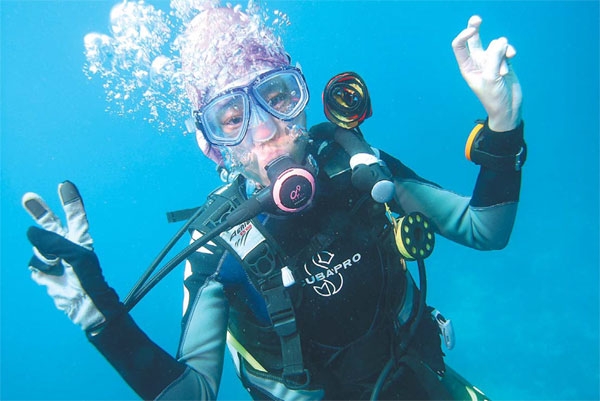Water worlds
Updated: 2014-05-18 09:08
By Eric Jou (China Daily)
|
|||||||||||
|
 |
|
|
China is bubbling with scuba enthusiasts. Eric Jou dives into the trend that's pulling in Chinese like a riptide.
The sky has been conquered. The mountains have been climbed. The seas have been sailed. All that's left to explore is underneath the oceans' surface. And a growing number of Chinese are joining the discovery of the world beneath the waves. The planet's underwater realm is something truly different, 25-year-old branding consultant Ge Jingwei says.
Ge, who has studied in London and has traveled the world, dove into scuba exploration on a trip to Thailand.
"I wanted to do something different," Ge says.
"I consider myself an advanced traveler. And I wanted to expand my travel territory to underwater tourism."
Scuba, the acronym for "self-contained underwater breathing apparatus", is an equipment system that allows divers to breathe underwater for a set amount of time. The term has become eponymous with diving.
Underwater tourism is pulling in Chinese like a riptide.
Destinations around Southeast Asia have been reporting a rise in Chinese scuba tourism and of Chinese seeking certification for deeper dives.
The number of students with diving certifications in China increased 82 percent between 2012 and 2013, the Professional Association of Diving Instructors reports. The number of instructors has also risen over 44 percent over the last year. This has increased the number of Chinese dive centers and resorts.
Professional Scuba Association China administrator Gallup Lee has taught scuba diving for 20 years. Lee, who's based in Hong Kong but travels across the Chinese mainland, says he has seen growing Chinese interest.
"I used to have this idea about scuba, that it was a sport that required a lot of equipment and hassle," Lee says.
"But a friend of mine who couldn't swim well brought me along on a scuba lesson. He'd just learned to swim. So I felt obligated to go and watch out for him. During the lesson, I learned scuba is simple and engaging."
Lee says it's a common misconception that scuba costs a lot of money and requires a lot of gear. There are costs, he says - for boats for deep-sea dives, flights to destinations and equipment. But, in pace with scuba's growth, more locations are offering comprehensive services.
Wen Zhiping got into scuba in Vietnam in 2007. She says she saw people doing something interesting and wanted to try it.
"I grew up next to the Xiangjiang River in Hunan," Wen says.
"Whenever I saw a watersport, I wanted to do it. It wasn't until I went to Semporna in 2009 that I got into certified diving."
Scuba diving is often divided between leisure diving and certified, professional diving.
The Professional Association of Diving Instructors is the top global scuba certification group. Divers can be certified for open-water dives, advanced open-water dives, rescue dives and dive master qualifications. Or they can earn instructor's licenses.
Today's Top News
UN chief saddened by Turkey's mine tragedy
Hanoi blamed for anti-China riots
Hypnotherapist offers stress relief
Therapy dogs help autistic children
China-Russia gas deal to be inked
2 Chinese killed in Vietnam riots
Report adds steam to Abe's ambitions
China: US must be objective about Asia tensions
Hot Topics
Lunar probe , China growth forecasts, Emission rules get tougher, China seen through 'colored lens', International board,
Editor's Picks

|

|

|

|

|

|





